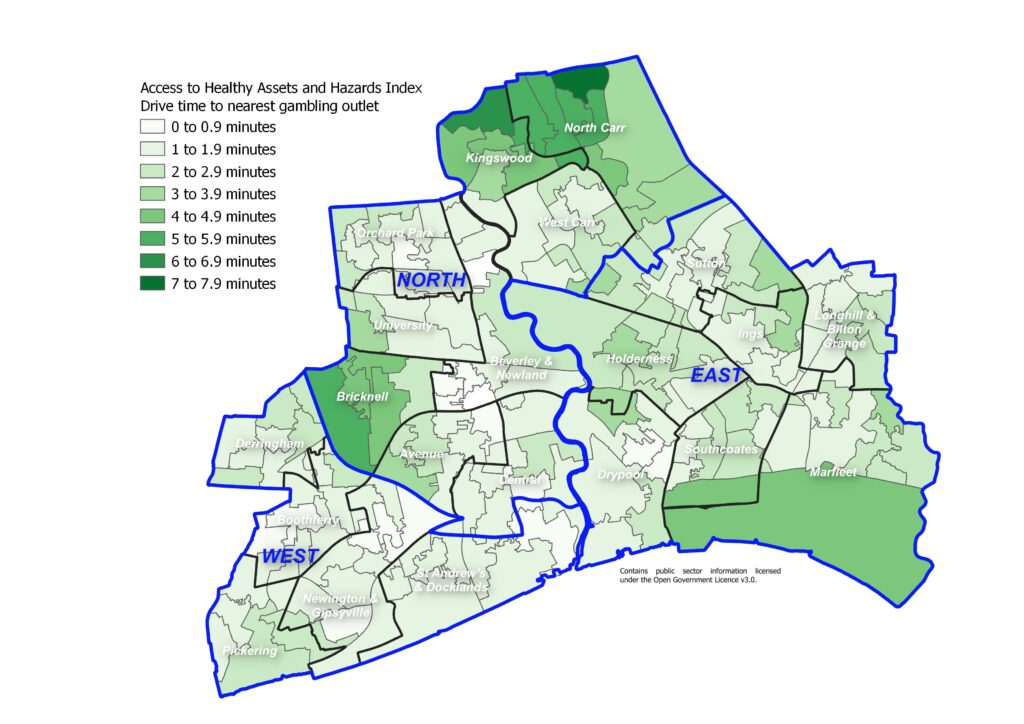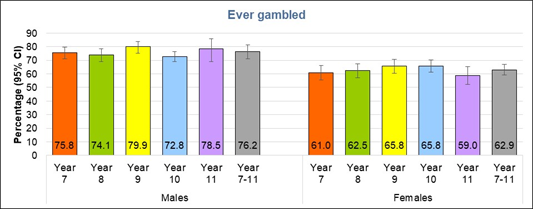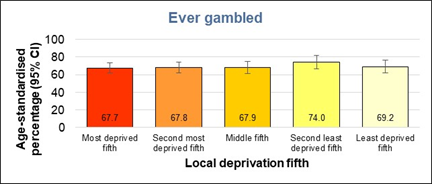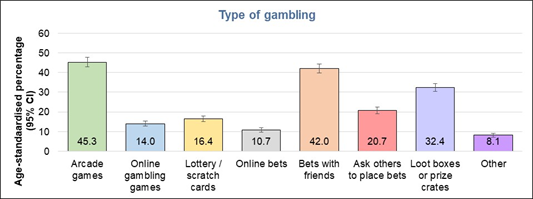This topic area covers statistics and information relating to gambling undertaken among young people in Hull including local strategic need and service provision. Further information relating to Gambling Among Adults is given under Lifestyle Factors within Adults. Gambling behaviour information has been collected within Hull’s Health and Wellbeing Surveys and full reports are available under Surveys within Tools and Resources.
Headlines
- The societal costs of problem gambling were estimated at least £1.27 billion in 2019/20 in England.
- All residents (and therefore all young people too) in Hull are within an eight minute drive of their nearest casino club or bookmaker (and virtually all residents are within a 3-4 minute drive) which gives an indication of the density of gambling outlets in Hull. It is likely that drive times would be even lower if all establishments were included where gambling occurs. Additionally, with an increased presence of online gambling, this makes gambling even more accessible.
- Gambling related harm affects far more people than just the problem gambler. Some estimates suggest that for every problem gambler, between 6 and 10 additional people (such as friends, family, co-workers) are directly affected. Furthermore, problem gambling is often present with other issues such as poor mental health, social isolation, housing problems and debt.
- In Hull’s Young People Health and Wellbeing Survey conduced among secondary school pupils in 2024, seven in ten had gambled previously. Males (765) were more likely to have previously gambled compared to females (63%), although there was not a great deal of difference in the percentage of young people who stated they had previously gambled based on whether they lived in the most deprived or least deprived areas of Hull. Young people who were White British (72%) were more likely to have previously gambled compared to minority ethnic groups (63%) as were young people whose daily activities were limited due to long-term illness or disability (78%) compared to young people without such illnesses or disabilities (67%).
- Among all young people, 45% had gambled through playing arcade games, 42% had bet with friends and just under one-third (32%) had used loot boxes or prize crates online.
- Young people were more likely to have stated they had gambled if they had poor or very poor physical health, poor or very poor mental health, were smokers, drank alcohol or if they vaped. Young people who ate 5-A-DAY portions of fruit and vegetables daily or who reported that they ate a healthy diet were less likely to gamble.
- A Gambling Harms Needs Assessment was conducted in Hull in 2019 with an update in 2024.
The Population Affected – Why Is It Important?
Societal harms of gambling have been focused on adults, and there is relatively little information on children and young people who gamble so the effects of gambling discussed below are focussed on adults.
From the Cards on the Table report in 2016, it is estimated that the societal costs of problem gambling were between £210 million and £560 million in 2016. However, the Department of Health and Social Care commissioned Public Health England (at the time – now the Office for Health Improvement & Disparities) to undertake a review of the evidence on gambling harms, and the harms associated with gambling were estimated to be at least £1.27 billion in 2019 to 2020 in England alone. The analysis included for the first time an estimate of the economic cost of suicide (£619.2 million) and provides an updated cost of homelessness associated with harmful gambling (£62.8 million).
The 2021 Health Survey for England half of people had participated in gambling activity in the last year (55% of men and 45% of women), although this fell to 36% once the National Lottery was excluded (39% of men and 33% of women), and fell further to 18% if scratchcards were excluded (23% of men and 13% of women). One in ten had participated in online gambling (excluding the National Lottery) in the last year (14% of men and 5% of women). People aged 45-54 years were the most likely to have gambled in the last year (61%) whereas those aged 16-34 years (39%) were the least likely to have gambled. However, this was generally associated with the National Lottery and/or scratchcards, and the youngest age groups were the most likely to have gambled once lotteries and scratchcards were not included (22% for 16-34s, 30% 45-54s and 7% for 75+ years) and gambled online excluding National Lottery (14% for 16-34s, 11% for 45-54s and 1% for 75+ years).
From the Cards on the Table 2016 report, it was estimated there were 373,000 problem gamblers, and 1.7 million at risk of problem gambling in England. Furthermore, as an Out of Luck Citizen’s Advice report states “Gambling related harm affects far more people than just the problem gambler. Some estimates suggest that for every problem gambler, between 6 and 10 additional people (such as friends, family, co-workers) are directly affected.”
In Public Health England’s 2021 report on gambling harms, it was found that there were strong associations between gambling harms and geographical areas of high deprivation such as the North of England, who may already be experiencing greater health inequalities. The review found a clear link between alcohol consumption and harmful gambling with 35% of non-drinkers participating in gambling compared to 74% of those who drank 50+ units of alcohol per week. Alcohol use in children and young people was also found to be a risk factor for subsequent harmful gambling. The review also highlighted the link between gambling and mental health issues. Evidence also suggests that people with gambling problems are at least twice as likely to die from suicide compared to the general population with one overseas study showing that people with a gambling disorder had a 19 times increased risk of dying from suicide.
A report published in March 2022 by the Commission on Crime and Gambling Related Harms explored the experiences of people directly affected by gambling and crime, and found that there was relatively low levels of understanding and support available within the criminal justice system regarding the effects of gambling. Furthermore, the report stated that many people who commit crime as a result of gambling addition or harms have experienced Proceeds of Crime Act (2002) proceedings. However, given the nature of gambling additional as a mental health disorder, and the lack of material benefit arising from gambling related crime, the report stated that this seemed paradoxical to the original purpose of the Proceeds of Crime Act which is to confiscate proceeds where people have benefitted from their crimes. Proceeds of Crime Act was an additional significant stressor on people in prison and particularly for families who lived with them. Even after the sentence was completed, Proceeds of Crime Act still remained a stressor for people and hindered future progress, recovery and rehabilitation.
The Hull Picture
Density of Gambling Outlets
The Access to Healthy Assets and Hazards which includes drive times to nearest gambling outlet was updated in 2024.
The Access to Healthy Assets and Hazards (AHAH) index is designed to allow policy and decision makers to understand which areas have poor environments for health, and to help move away from treating features of the environment in isolation.
The Access to Healthy Assets and Hazards index is comprised of four domains: access to retail services (fast food outlets, gambling outlets, pubs/bars/nightclubs, off licences, tobacconists), access to health services (GP surgeries, A&E hospitals, pharmacies, dentists and leisure centres), the physical environment (green and blue spaces) and levels of air pollution (nitrogen dioxide (NO2), particulate matter smaller than 10 microns (PM10) and sulphur dioxide (SO2)).
In 2024, the Access to Healthy Assets and Hazards Index is very high in Hull with 44.7% of Hull’s population residing in the bottom fifth of areas nationally in relation to the Access to Healthy Assets and Hazards Index. The percentage nationally is 20.9% and across the other 14 lower tier local authorities in the region the range is from 1.3% to 32.6%.
Compared with benchmark
| Indicator | Period | England | Yorkshire and the Humber region (statistical) | Kingston upon Hull | East Riding of Yorkshire | North East Lincolnshire | North Lincolnshire | York | North Yorkshire UA | Barnsley | Doncaster | Rotherham | Sheffield | Bradford | Calderdale | Kirklees | Leeds | Wakefield |
|---|---|---|---|---|---|---|---|---|---|---|---|---|---|---|---|---|---|---|
Access to Healthy Assets & Hazards Index (Persons All ages) | 2024 | 20.9 | 18.2 | 44.7 | 9.4 | 23.6 | 10.7 | 1.3 | 13.4 | 10.2 | 6.2 | 9.7 | 13.7 | 32.6 | 5.1 | 13.1 | 30.3 | 18.8 |
| Indicator | Period | England | Yorkshire and the Humber region (statistical) | Kingston upon Hull | East Riding of Yorkshire | North East Lincolnshire | North Lincolnshire | York | North Yorkshire UA | Barnsley | Doncaster | Rotherham | Sheffield | Bradford | Calderdale | Kirklees | Leeds | Wakefield |
|---|---|---|---|---|---|---|---|---|---|---|---|---|---|---|---|---|---|---|
Access to Healthy Assets & Hazards Index (Persons All ages) | 2024 | 20.9 | 18.2 | 44.7 | 9.4 | 23.6 | 10.7 | 1.3 | 13.4 | 10.2 | 6.2 | 9.7 | 13.7 | 32.6 | 5.1 | 13.1 | 30.3 | 18.8 |
Despite the very high levels in Hull, the index has decreased considerably since 2016 when nine in ten residents lived in the worst fifth of areas of England in relation to the index, although there was a large decrease between 2016 and 2017 to 46% with only relatively minor changes to 2022 and 2023.
In 2024, it is estimated that 120,220 residents in Hull live within areas defined as the bottom fifth of areas nationally based on the Access to Healthy Assets and Hazards Index.
Compared with benchmark
Access to Healthy Assets & Hazards Index (Persons All ages)
|
Period
|
Kingston upon Hull |
Yorkshire and the Humber region (statistical)
|
England
|
||||
|---|---|---|---|---|---|---|---|
|
Count
|
Value
|
95%
Lower CI |
95%
Upper CI |
||||
| 2016 | • | 233157 | 90.0% | - | - | 22.2% | 21.2% |
| 2017 | • | 120814 | 46.3% | - | - | 14.1% | 21.1% |
| 2022 | • | 114694 | 44.3% | - | - | 19.9% | 22.6% |
| 2024 | • | 120220 | 44.7% | - | - | 18.2% | 20.9% |
Source: Consumer Data Research Centre
Information relating to version 4 of the Access to Healthy Assets and Hazards index is available at lower layer super output area geographical level. There are 33,755 lower layer super output areas in England, and the percentile score has been calculated for each of the 168 lower layer super output areas in Hull. The index was updated in July 2024, and information on the individual components is available.
The drive times to the nearest casino club or bookmakers are low in Hull. The drive time did not include all gambling establishments as adult gaming centres or other locations where gambling occurs such as bingo halls, amusement arcades or places where scratch cards or lottery tickets can be purchased.
Whilst not everyone in a city will have access to a car or van (35% of households in Hull compared to 23% of households in England), the map does illustrate the density of gambling outlets in Hull, and many people including children and young people will likely be a relatively short walk away from their nearest casino club or bookmaker. Furthermore, it is likely that the travel times would be even lower if all establishments were included where gambling occurs, and additionally there is an increased presence of online gambling which makes gambling even easier to access.

Information on the other indicators is available under Geographical Area under Place.
Prevalence of Gambling
Much of the information in this section comes from the local Health and Wellbeing Surveys. A number of Health and Wellbeing Surveys have been completed with young people in Hull through secondary schools since 2002 which provide valuable information on the health, wellbeing and lifestyle behaviours of the young people in Hull. The latest survey was conducted between March and May 2024, and involved almost 4,000 secondary school pupils mainly from eight of Hull’s 13 mainstream secondary schools. Further details are available on Local Surveys Involving Young People under Tools and Resources).
However, the 2024 survey was the first time to have asked young people about their gambling, and this included one question asking if they had done any of the following:
- Play arcade games to win money
- Play gambling games online
- Buy lottery tickets or scratch cards
- Place bets online
- Place bets with friends
- Ask parents or others to place bets for you
- Buy or make app or in-game purchases on loot boxes or prize crates when gaming
- Other gambling activity
Young people were given the option – for each of these – to select yes, no, don’t know or rather not say. The percentages have been reported as the number who stated yes out of the number who stated either yes or no.
Overall, seven in ten had previously gambled and this was higher among males (76.2%) compared to females (62.9%).

There was not a great deal of difference in the percentage of young people who stated they had previously gambled based on whether they lived in the most deprived or least deprived areas of Hull.

Young people who were White British (72.4%) or whose first language was English (70.2%) were more likely to state they had previously gambled compared to young people from minority ethnic groups (62.5%) or young people whose first language was not English (60.8%). Young people whose daily activities were limited due to long-term illness or disability were also more likely to state they had previously gambled (77.8%) compared to young people without such illnesses or disabilities (67.1%).
Among all young people, 45% had gambled through playing arcade games, 42% had bet with friends and just under one-third (32%) had used loot boxes or prize crates online.
It was not possible to specify in detail what was meant by some of the gambling classifications. It is possible that arcade games could have involved playing arcade games at the seaside such as the machines involving two pence pieces where the accumulated coins are pushed down by sliding ‘stairs’ or whether this is classic or other slot machines where the same icons on different reels must be lined up or show the same icon across a row. Similarly, it was not specified what was meant by placing bets with friends so this could have been related to dare or challenge, bets with money or other ‘currency’, or some other kind of bet.

Young people were more likely to have stated they had gambled if they had poor or very poor physical health, poor or very poor mental health, were smokers, drank alcohol or if they vaped. Young people who ate 5-A-DAY portions of fruit and vegetables daily or who reported that they ate a healthy diet were less likely to gamble.
Strategic Need and Service Provision
Some information relating to gambling behaviours and potentially harmful gambling behaviours has been collected in Hull to give an indication of the prevalence of gambling and gambling harm in Hull. However, information is generally relatively limited and this makes assessing and dealing with problem gambling difficult.
With two-thirds of adults gambling, and almost one third doing so each week, the potential for gambling-related harm is high. The actual level of gambling-related harm is unknown for Hull. However, it is estimated that more than 14,000 adults in Hull have experienced some problems related to gambling including 8,800 adults who state they have undertaken some of these problem gambling behaviours within the last year (including 3,150 adults who have stated that this happens weekly or monthly). Despite asking about gambling among young people in the recent survey, it is even more difficult to assess problem gambling among young people or its impact. Certainly, problem gambling within any family could have a high impact on the whole family including children and young people as well as making gambling seem the ‘norm’. Furthermore, it is likely that exposure to advertising relating to gambling among young people is relatively high as it is for adults.
A Gambling Harms Needs Assessment was completed in Hull in 2019, and had a rapid refresh in 2024 – available in the resources section on this page – with the following noted:
- It recognised that Hull City Council as a licensing authority has a statutory role in the licensing and regulation of gambling premises. It also has a duty to promote the health and wellbeing of the population.
- Many people chose to gamble, but staff in services in Hull have observed an increase in problem gambling amongst women, largely linked to online gambling with online bingo the most frequently cited form of gambling amongst women accessing services in Hull.
- Gambling harms are likely to widen inequalities between communities in Hull and between Hull and less deprived localities. This is because problem gambling and gambling related harms are associated with social deprivation. Hull is the fourth most deprived local authority in England.
- There is no routinely locally collected data to inform a local response. National prevalence data is considered to be a conservative estimate of problem gambling prevalence not capturing data amongst all vulnerable groups. Hull is highly unlikely to have lower than average levels of problem gambling prevalence. We do not know the extent or cost of gambling related harms in Hull but there is clear evidence of their existence and examples of their impact on individuals, families and services.
- A growing appreciation of the harms associated with gambling is evident in national policy, with advocacy for a multi-agency approach across services to prevent and minimise harms. There are clear calls for a change in emphasis away from individualised responsible gambling behaviour to a wider recognition of the impact of gambling on families and communities and the promotion and availability of gambling products in our communities.
- Hull is estimated to have between 645 and 3,871 problem gambling adults (16+), depending on the problem gambling prevalence rates we apply to our population.
- Nationally problem gambling prevalence amongst young people is considered to be rising, from 0.4% in 2016, to 1.7% in 2018. Hull may have 233 Problem Gambling 11-15 year olds (applying national prevalence estimates to young people aged 11-15 in Hull). Our 2024 Children and Young People Survey asked questions of our 11-16 pupils on gambling activities. This page will be updated with the findings later this year.
- Local services exist (industry funded) to support people affected by problem gambling but referral pathways and availability are not well understood amongst frontline services.
- It was recommended that there should be training of frontline service staff, increased awareness raising for gambling harms among children and young people, further data collection and screening to measure problem gambling for both adults and young people, increased awareness of local treatment services, and assure compliance with safeguarding responsibilities with gambling operators.
Resources
Hull’s Health and Wellbeing Survey 2019
Health Survey for England: NHS Digital: https://digital.nhs.uk/data-and-information/publications/statistical/health-survey-for-england
Public Health England. Landmark report reveals harms associated with gambling estimated to cost society at least £1.27 billion per year. Public Health England, 2021. https://www.gov.uk/government/news/landmark-report-reveals-harms-associated-with-gambling-estimated-to-cost-society-at-least-1-27-billion-a-year
Smith L. Commission on Crime and Gambling Related Harms. Surviving, not living: lived experiences of crime and gambling. University of Lincoln, 2022. https://howardleague.org/wp-content/uploads/2022/03/Lived-Experiences-report-FINAL-2.pdf
Updates
This page was last updated / checked on 19 May 2025.
This page is due to be updated / checked in April 2026.